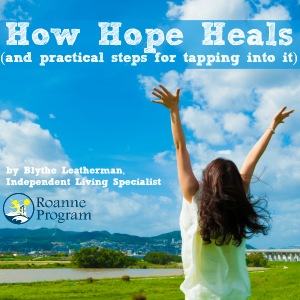How Hope Heals (and practical steps for tapping into it)
“Hope is the thing with feathers
That perches in the soul
And sings the tune without the words
And never stops at all.”
What is it?
Though it is hard to define exactly, hope is perhaps the most important part of recovery. It has been described as the belief that things will be better in the future. Hope is expectation, anticipation, desire, and having something to look forward to. It provides the motivation to put effort into improving your life and working toward your dreams. At OPI, we believe that a better future is possible – that’s why our slogan is Turning Hopelessness into Happiness. We use dialectical behavior therapy (DBT) to inspire hope for people with borderline personality disorder by laying out the steps necessary to recover and live a full, independent life. While you may not feel it now, the idea that you could experience hope in the future can be enough to get you out of bed every morning. Until you can feel it for yourself, we will hold onto the hope for you.
“It’s amazing how a little tomorrow can make up for a whole lot of yesterday.”
― John Guare, Landscape of the Body
Keeping it real
In discussing hope, we never want to trivialize or make light of a person’s struggles. Experiencing hope does not mean that you don’t still need help or that you don’t also feel despair sometimes. It can actually be hard to admit to others when you feel hopeful, because you might be afraid that it will overshadow or negate your pain. While it may not come naturally to you, you do have the ability to choose hope and leave the door open to whatever may follow. You don’t have to change your whole life at once – this small first step makes a world of difference. Even if you don’t feel comfortable sharing it with others yet, the first step is to foster a seed of hope in yourself by acknowledging how far you have come and how much you have endured in life already. You are stronger than you think.
“When you have lost hope, you have lost everything. And when you think all is lost, when all is dire and bleak, there is always hope.”
― Pittacus Lore, I Am Number Four
Moving forward
In order to avoid denial or false hope, we first have to accept the nature of reality. The foundation of Buddhism is the understanding that life is dukkha – suffering, impermanence, and stress. Life will never be easy, but you can rely on hope as an internal source of strength and a foundation for happiness. Hope alone is not enough; you need practical help and a plan to get you to the next stage. But hope is necessary to inspire action, especially when the situation seems bleak from a logical point of view. Remember: hope is contagious! When you feel it yourself, use it to motivate others – and when you’re having trouble feeling it, let other people inspire you.
“Listen to the mustn’ts, child. Listen to the don’ts. Listen to the shouldn’ts, the impossibles, the won’ts. Listen to the never haves, then listen close to me…
Anything can happen, child. Anything can be.”
How can you build hope?
Now that we’ve covered the definition of hope, what are some practical steps you can take to build and maintain it?
- Reading about success stories
- Observing and talking to others who have struggled and made progress in their recovery (read some of our testimonials here!)
- Putting your vision for the future into words, by setting specific goals and planning the path you’ll take to achieve them
- Taking small steps toward your goals
- Remembering past achievements and positive experiences
- Cultivating gratitude for the things you enjoy and the gifts you have been given in life
- Reflecting on your own unique strengths and positive qualities
- Inspiring others with your own success story
At Optimum Performance Institute and our OPI Intensive for young adult men and women with Borderline Personality Disorder, we’ve been living our mission of Turning Hopeless into Happiness for ten years. For more information on our residential and intensive outpatient (IOP Day Treatment) programs, call us at now 866-661-3982 or click HERE to submit an online form. We want to help and will be in touch promptly.

